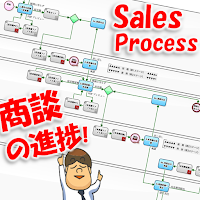I'm going to consider "Starter Template" of the 2016 edition.
This time, it is going to be the 2nd of the series, "Procurement Request" in simplicity.
This procurement flow is a Workflow that allows you to comfortably make requests for anything you think you want to or should buy.
That is, it is possible to request for anything, as long as being an employee, from consumable goods such as "copy paper", "drinking water", or "detergent", to fixtures like "desk", "vacuum cleaner", or "personal computer". However, it is left to the Procurement Department for actually whether or not purchased. Especially, for those difficult to determine the need and urgency, it will be in a status of "pending the decision for purchase" for long term.
Incidentally, "being approved on the Approval flow" in advance will be the premise of purchasing of the "application for purchasing items of more than 100,000 JPY ".
[Procurement Request]
















































